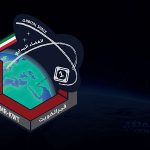Building a space project does not necessarily have to have the backing of a government, or a lot of money as CEO Bassam Alfeeli has proved with the launch of his start-up Orbital Space.
 Back in the 1960s, when the Soviet Union had recently launched Sputnik 1 (1957) and the US had just successfully launched its first communication satellite, Telstar 1 (1962), only one country in the region was carefully eyeing potential space opportunities, and that was Kuwait.
Back in the 1960s, when the Soviet Union had recently launched Sputnik 1 (1957) and the US had just successfully launched its first communication satellite, Telstar 1 (1962), only one country in the region was carefully eyeing potential space opportunities, and that was Kuwait.
The Arab country eventually went on to build its own ground station a regional first in Um Alaish in 1968 (inaugurated in 1969, as severe dust storms delayed the project). The ground satellite station grew to a complex that housed three 30-metre satellite dishes by 1981 as part of Kuwaits efforts to support satellite communication services, space exploration and the like. In fact, the station will go down in history as one of the few that received signals from the Apollo 12 mission, which it broadcast to the world.
Unfortunately, that ground station was destroyed in the Iraqi invasion of Kuwait in 1990, and in 2009, the remaining dishes, wires and other equipment at the site were sold as scrap material. No further effort was made to revive that long-buried dream. Until now, thanks to a Kuwaiti engineer whose love for space has led him to single-handedly develop another ground station and engage science volunteers in a CubeSat project, in the hope of inspiring Kuwaitis to once again rise to the call of space.
Bassam Alfeeli is the founder and GM of Orbital Space, a start-up operational since 2018 in Kuwait. Today, he runs probably the only privately-owned Earth station for CubeSats in the region.
Historically, Kuwait was one of the pioneers in the region with regard to space technologies. In fact, when the International Telecommunication Union (ITU) called its extraordinary administrative conference in 1963, also known as the Space Conference, to discuss satellite communication and how they will manage the frequency allocation, Kuwait was there. Five years later, Kuwait built the Um Alaish ground station. So we do have a history of space long before any other country in the GCC, and I think we must make every effort to revive it, says Alfeeli.
Kuwait University (KU) was also probably the first academic institution in the region to offer a remote sensing programme as part of its curriculum, but there were no further attempts to develop interest in space technology. There was no market demand for it.
Around 2010, Alfeeli began to talk to his then employer, the Kuwait Institute for Scientific Research (KISR), about developing and expanding its remote sensing unit into a space programme. They have had a remote sensing unit since 1995, which was just processing images purchased from vendors. They developed the atlas of Kuwait from satellite images, but didnt have the capability to acquire their own images and here, I saw a fabulous opportunity.
The Kuwait Foundation for the Advancement of Science, the countrys funding agency for science and technology initiatives, did express interest in supporting the initiative, but it required an entity like KU or KISR to champion the effort. Unfortunately, there was almost no interest.
In 2017, Alfeeli was inspired by the UAE space programme. With some encouragement from the UAE Space Agency, he managed to get a Kuwaiti delegation from KU and KISR to visit the UAE to learn about their space initiatives and activities, hoping this would drive them to make efforts toward establishing a space programme. Those efforts did not yield any results, so he decided to take the journey without government support. In 2018, Orbital Space was born.
Having failed to trigger the government to establish a space programme in Kuwait, I am hoping that if I show some success, I will perhaps be able to grab the attention of the decision-makers. I truly believe in this, and Im using my personal funds to lead the establishment of the space programme. Some think Im crazy, as Im risking everything I have for this dream. I think the government will follow once they see success, and thats my strategy for now.
An electrical engineer with a degree from the Florida Institute of Technology and a minor in Space Transportation Systems, Alfeeli had the opportunity to visit the neighbouring Kennedy Space Centre often, learn from astronauts and space hardware engineers, and visit the launch pads and clean rooms where they assemble space hardware.
I was 18 back then and when I got a scholarship to study abroad, I deliberately chose a university that was close to the Kennedy Space Center. Access wasnt so restricted in the 90s, and what I experienced there fuelled my passion for space. When I finished my degree, I returned to Kuwait to work for the Kuwait Institute for Scientific Research.
In 2013, Alfeeli moved to the Kuwait Foundation for the Advancement of Science, where he has worked ever since. Orbital Space takes up his evenings and weekends, as he manages several initiatives in parallel. He has set up a basic ground station called Um Alaish 4, after its predecessor, to receive signals from CubeSats. Orbital Space is also involved in building the countrys first CubeSat, with a group of around 15 Kuwaiti volunteers. The Kuwaiti engineer initiated the CubeSat project as a tool to attract space enthusiasts.
The idea is to create a platform to bring together a community of space enthusiasts in Kuwait. There is interest from the young generation, but there is no project that engages them to create that critical mass. I figured we needed a hub where people can come together and do that. So Orbital Space has now created that opportunity and is open to anyone who wants to join us to promote space in Kuwait, Alfeeli says.
By creating greater awareness through public talks on the history of the ground station in Kuwait and hands-on workshops on CubeSats for kids, he hopes to plant the seeds of a space programme in Kuwait. In addition to all the other initiatives, Orbital Space has also launched a competition for high-school students and undergraduate students in partnership with US-headquartered space commercialisation company Nanoracks, with the winning experiment to be sent to the International Space Station (ISS).
We will send the first science experiment from Kuwait to space. We started a competition for students in high school and the undergraduate level. We have asked for submissions, and the winning experiment will go to space and one of the astronauts onboard ISS will conduct the experiment on behalf of the students.
Space projects require no small investment. A basic CubeSat could take anything upwards of $30,000 to build and a launch costs nothing less than $100,000. At present, we are designing the bus for a 1U CubeSat and are in discussions with some Kuwaiti companies to fund the launch, says Alfeeli.
But is there revenue to be made from small space projects? Alfeeli says he is looking to monetise his projects and has identified a couple of revenue streams.
At present, what we have is a very basic ground station, and the idea is to receive signals from existing CubeSats orbiting the Earth. This station is now linked into a global network of ground stations and is open source, so we are giving access to others to use this ground station as well. To explain, CubeSats by design use low Earth orbits (LEO), which means CubeSat owners have line-of-sight access to their CubeSats for a limited time period (three-four passes a day, 8-12 minutes per pass). Therefore, a network of ground stations can give greater access to CubeSats. What we can offer is access when the satellite passes over the region; CubeSat owners can have access to their spacecraft and receive signals from it through the network.
Security issues are not a concern here, as CubeSats are mostly designed by academic institutions for education purposes and transmitted on amateur radio frequencies, he points out.
At present, Orbital Space is opening its ground station out to all global entities, allowing them to gather the data from the signals, but Alfeeli hopes to eventually start selling that access as a service.
We need to build a track record first so customers can trust our services. We are building sophistication into the ground station gradually so it also becomes commercially viable. We would love to have the capability to create a sophisticated station that can allow anybody from all over the world to schedule a CubeSat pass, whether it is for weather information, measurement of solar activities, somebodys experiment in space, or event for entertainment (games and social interactions). If they are interested in getting their data from the CubeSat when it is far away from their location, they can access their satellite on orbit through this ground station. The aim is to charge per minute based on how much they want for access to their satellite, explains Alfeeli.
He adds that the team started with one antenna and one network, and has now expanded to two of each. Another level of service is to offer sophisticated data processing of raw data as well, if the customer is interested. Another revenue possibility could come from the excitement of working on CubeSat projects. Many university groups would be more encouraged to pursue CubeSat projects if there were local support and mentoring services.
We aim to have the capabilities to offer services to design, build, test and operate CubeSats to students and amateurs, so they can gain the know-how to build a satellite as well. If they want to do a space-related experiment, they at least now have the ability to learn somewhere. We hope to monetise this opportunity. The idea is to develop a space industry in Kuwait. My vision is to provide access to space to all.
Orbital Space is aiming for a 2022 launch for its first CubeSat project.












































































